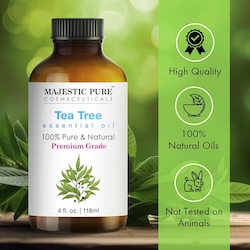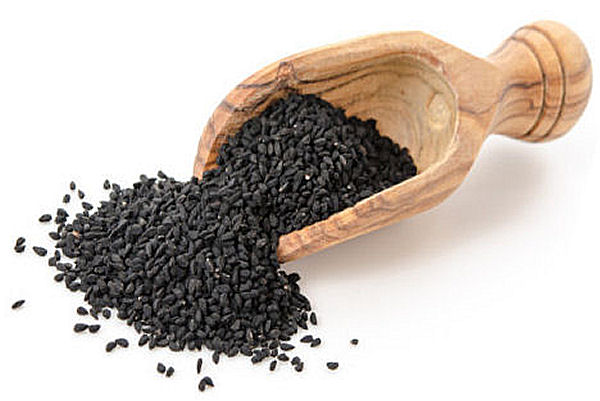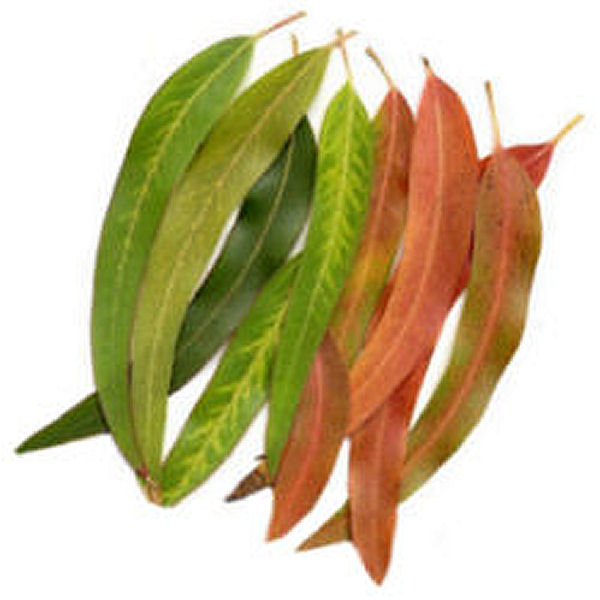What is Tea Tree Oil?

Tea Tree Oil (also known as Melaleuca) is a natural antibacterial disinfectant that was commonly used as a general antiseptic by the aborigine tribes for thousands of years. More recently, the scientific community has confirmed that Tea Tree Oil has tremendous medicinal benefits. It is a light yellow oil that has a scent similar to nutmeg, and it is produced by steaming tea tree leaves and then squeezing the oil out.
What are the Benefits of Tea Tree Oil?
Tea Tree Oil has wonderful properties that makes it a popular natural agent for
curing all three types of infectious organisms: fungus, bacteria, and virus.
More importantly, it is known to effectively fight a number of infections that are
resistant to some antibiotics.
Therefore, Tea Tree Oil is an excellent natural remedy for hundreds of bacterial and fungal
skin ailments such as acne, abscess, oily skin, blisters, sun burns, athlete's foot, warts,
herpes, insect bites, rashes, dandruff and other minor wounds and irritations.
Studies have shown that Tea Tree Oil also treats respiratory problems ranging from common
sore throats, coughs and runny nose to severe conditions such as asthma, tuberculosis, and bronchitis.
The anti-viral properties of the oil fight many common infectious diseases such as
chicken pox, shingles and measles, flu, cold sores and verrucae. It also strengthens the
body's immune system, which is often weakened by stress, illness, or by the use of antibiotics and
other drugs. It can also be used as a mouth wash, since it is highly
effective in healing oral candidiasis (a fungal infection of mouth and throat).
Uses of Tea Tree Oil
Skin Infections
Acne Treatment
1A common use of Tea Tree Oil is as a natural Acne treatment. An effective remedy is to dab a cotton swab into a mix of equal amounts of tea tree oil and cold pressed olive oil, then gently apply the oil onto the affected areas before going to sleep. In the morning, rinse off the oil and wash your face as usual. Repeat this daily.
Note: If you have a sensitive skin, diluting the Tea Tree oil would be better. Simply add one drop of tea tree oil in one tsp of olive oil and apply it onto the affected area.
If you have oily skin, simply add 3-4 drops of Tea Tree oil in half a cup of distilled water and store it in an airtight container. Dip a small cotton swab in this mix and gently apply it onto the affected skin before going to bed. Be sure to have the affected area cleansed before applying the Tea Tree oil mix. And shake well before every application.
Boils and Carbuncles
Tea Tree Oil has also been used for the treatment of Boils or Carbuncles. It has been found to speed up the healing process while also relieving discomfort. Dip a cotton swab into a mix of equal amounts of tea tree oil and olive oil and then apply it directly onto the boil or carbuncle. Be sure to carefully dispose of the swab and make sure it does not touch any uninfected parts of your skin. Repeat this 3 to 5 times per day until the boil has healed.
Toenail Fungus
Tea Tree Oil help treat toenail fungus infections. Simply apply 1 to 2 drops of the oil directly onto the infected toenails and rub it above and under the tip of the nail. Repeat this once per day.
Warts
Many people have also found that Tea Tree Oil can be used as a very effective treatment for Genital Warts. An effective remedy is to dip a cotton swab into the tea tree oil and gently apply it to the wart and apply a bandage over it. Repeat this once a day for 10 days.
Yeast Infection
2Research shows that Tea Tree Oil can help treat Yeast Infections. For milder yeast infections, the topical use of a mix of Coconut and Tea Tree oils may help. However, for severe infections using it along with conventional drugs can speed up the healing process. A simple remedy is to mix 3-4 drops of Tea Tree Oil in one tablespoon of coconut oil and apply it topically just outside of the vaginal area before going to bed. The amount of Tea Tree Oil can be reduced depending on the sensitivity levels of your skin.
Bad Breath, Inflamed Gums, and Plaque
Tea Tree Oil, when used as a mouth wash, acts as a natural cure for bad breath, oral candidiasis, gingivitis, plaque, and inflamed gums. It also kills mouth bacteria prior to dental surgery and also reduces mouth irritation that is often caused by dental procedures.
- Add 3 drops of Tea Tree Oil to a cup of warm water.
- Use the solution as a mouthwash two to three times daily.
- Always spit out the Tea Tree Oil mouthwash. Do not swallow it.
- You may also add 1 drop of Tea Tree Oil to toothpaste when brushing teeth.
Sore Throat and Congestion
Tea Tree Oil can be combined with a simple steam inhalation technique to naturally cure congestion, sore throat, chest infections, and clearing up mucus:
- Fill a large cooking pot or bowl with water.
- Bring the water to a boil.
- Remove the pot from the stove and add 2 to 3 drops of Tea Tree Oil into it.
- Cover your head with a towel and lean over the top of the bowl so that the long ends of the towel are hanging down at the two sides of the bowl.
- Inhale the vapors for about 5-10 minutes.
- Repeat the process each night before going to bed until symptoms are cured completely. If symptoms persist for more than 5 days it is best to consult your doctor.
Canker Sores and Laryngitis
Diluted in water, Tea Tree Oil is an effective treatment for canker sores and laryngitis:
- Add 3-4 drops of Tea Tree Oil to one cup of warm water.
- Gargle this solution twice daily. Do not swallow.
Dandruff and Lice
Studies have shown that shampoos with 5% of Tea Tree Oil can cure dandruff and help get rid of head lice. You can also create your own shampoo by mixing 1 drop of tea tree oil per 1 oz. of your regular shampoo. Massage the mixture into your scalp and then rinse as usual.
What are the Side Effects of Tea Tree Oil?
Pregnant and breast-feeding women should avoid the use of Tea Tree Oil.
Undiluted Tea Tree Oil can cause itchiness, irritation, and redness on sensitive skin. Therefore, if you have sensitive skin, it is always safer to dilute the oil in another base oil such as olive oil.
Pure Tea Tree Oil should never be taken internally in its undiluted form. Extra care should be taken when using it near the eyes, genitals, or even as a mouthwash. If taken internally, Tea Tree Oil can result in diarrhea, vomiting, impaired immune function, excessive drowsiness, sleepiness, confusion, poor coordination, and even coma. If you notice any of these symptoms of overdose, seek medical attention immediately.
Where and How to Buy Tea Tree Oil
Pure Tea Tree Oil and shampoos that contain Tea Tree Oil can be found in almost any natural health or nutrition store, or from online retailers such as Amazon.com (see below).





Ashok Jain, Tea tree oil has antibacterial, anti-fungal and antiviral properties. Simply mix 5-6 drops of the oil to half a cup of water and use it three times daily as a mouth wash. Hope it helps!
I have Oral Lichen Planus in the mouth. I read somewhere on the net that tea tree oil can help me. Should I use it?
I did not read if tea tree oil was good for pain. Did I miss something? I have pain in my leg every morning. Will it help? If not is there anything that will help? I do not want to take painkillers.
I get cold sores in my nostrils and no over-the-counter remedies are of any help at all. Thank God that I have discovered tea tree oil - it often keeps them away altogether when applied as soon as I feel them coming on. I mix just a few drops with a little water and apply with a cotton ball.
Just wanted to share as I am certain there are other people who struggle with the same thing but no one I ever talked to including doctors had any suggestions but this seriously works!
I had a skin cancer in my temple, I applied Tea Tree Oil
on it for several weeks and it's healed up!
In what form do I take tea tree oil for a respiratory infection? Thank you!
My son goes to the boys and girls club and one day he came home with a little rash - red blister like bumps under his armpit. I wasn't sure what to do. So, I wiped the area with alcohol and gave him allergy medicine. Three days later he had REALLY bad looking blister like bumps on his knees and elbows. I ended up taking him to the ER to find out he had a condition called Molluscum Contagiosum also known as (Water Warts) that is contagious if the blister like bump breaks open. The doctor said that there isn't any medicine to get rid of the rash and it can take weeks months even years to leave the body. So, I tried drying out the Water Warts by using rubbing alcohol on them. Which seemed to be working just not fast enough and wasn't keeping them from coming back. I did some research on pox and rashes and came across Tea Tree oil. I was a little iffy on using it but it was worth a try. Applied the Tea Tree oil on the affected area and saw amazing results the next day and by the end of the week they were pretty much gone.
Linda Moore, Tea Tree oil works amazing to remove acne. I have a small bottle of Tea Tree oil on my washroom counter, ready to attack the acne as soon as I see a pesky pimple appear. Touch wood, it has been years, I have not suffered from acne. I kill it right away by applying 100% Tea Tree oil directly onto the affected skin and leaving it on over night. However, if you have sensitive skin, you can dilute it with a small amount of coconut oil. My sister had recurrent severe acne and she made a toner by mixing about 10 drops of Tea Tree oil in a cup of filtered water and stored it in a glass bottle. Applying this mix, with a cotton ball all over the affected skin, every night after cleansing the face cleared her acne once for all. Remember to shake the Tea Tree oil mixture well every time before applying. She doesn't have acne anymore but she still uses the Tea Tree oil toner every night just to keep the pesky pimples away. The best time to apply Tea Tree oil is before bed time to avoid being an annoyance for people around you due its strong smell and also to let it work its magic throughout the night uninterrupted. I hope it helps!
I have heard and seen many articles on tea tree oil benefits and always found that it is best for acne treatment. But I have concern that, Is it that much effective? I mean I never heard anyone nearby me who has used the tea tree oil and successfully had acne removed.
Can Tea Tree Oil get rid of skin tags on the neck?